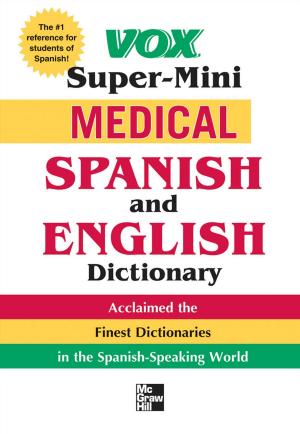Multimodal Cardiovascular Imaging: Principles and Clinical Applications
Nonfiction, Health & Well Being, Medical, Specialties, Radiology & Nuclear Medicine, Internal Medicine, Cardiology| Author: | Olle Pahlm, Galen S. Wagner | ISBN: | 9780071613477 |
| Publisher: | McGraw-Hill Education | Publication: | April 1, 2011 |
| Imprint: | McGraw-Hill Education / Medical | Language: | English |
| Author: | Olle Pahlm, Galen S. Wagner |
| ISBN: | 9780071613477 |
| Publisher: | McGraw-Hill Education |
| Publication: | April 1, 2011 |
| Imprint: | McGraw-Hill Education / Medical |
| Language: | English |
A complete guide to using multimodal imaging in cardiac practice
4 STAR DOODY'S REVIEW!
"In addition to compiling the various imaging modalities used for clinical diagnosis in cardiovascular disease, the book also summarizes the present and future applications of combined imaging modalities for better understanding the underlying pathophysiologic basis of cardiovascular diseases....This book is unique in the way it comprehensively reviews both the current and future applications of multiple imaging modalities."--Doody's Review Service
Multimodal Cardiovascular Imaging: Principles and Clinical Applications offers a unique “matrix” approach to help you choose the most appropriate combination of imaging modalities for the management of patients with cardiovascular disease. The book discusses the various options available, how they work, the benefits and drawbacks of each, and what modalities will best work in conjunction with each other for a specific condition.
Featuring contributions from more than 60 international authors and enriched by 225 half-tone modality images and 130 full-color illustrations, Multimodal Cardiovascular Imaging: Principles and Clinical Applications is divided into three sections:
Section 1 contains chapters that focus on the use of ten specific clinically available diagnostic modalities and their broad application to clinical cardiology. Modalities discussed include:
- Echocardiography
- Phonocardiography
- Myocardial Perfusion SPECT and PET
- Coronary Angiography
- Cardiac CT
Section 2 includes six chapters that present “visions of the future” for combining multiple diagnostic modalities. They form the foundation for understanding the pathophysiologic basis of clinical cardiovascular conditions using prototypes, simulations, models, and tutorials.
Section 3 considers several cardiovascular conditions and how multimodal imaging can provide diagnostic and therapeutic decision support to optimize the clinical care for each of them. Some chapters in this section also include case reports of how clinicians/scientists are using multimodal imaging modalities to improve their clinical therapeutic decision support. Conditions include:
- Congenital Heart Disease
- Ischemic Heart Disease
- Acute Myocardial Infarction
- Aortic Disease
- Atrial Fibrillation
A complete guide to using multimodal imaging in cardiac practice
4 STAR DOODY'S REVIEW!
"In addition to compiling the various imaging modalities used for clinical diagnosis in cardiovascular disease, the book also summarizes the present and future applications of combined imaging modalities for better understanding the underlying pathophysiologic basis of cardiovascular diseases....This book is unique in the way it comprehensively reviews both the current and future applications of multiple imaging modalities."--Doody's Review Service
Multimodal Cardiovascular Imaging: Principles and Clinical Applications offers a unique “matrix” approach to help you choose the most appropriate combination of imaging modalities for the management of patients with cardiovascular disease. The book discusses the various options available, how they work, the benefits and drawbacks of each, and what modalities will best work in conjunction with each other for a specific condition.
Featuring contributions from more than 60 international authors and enriched by 225 half-tone modality images and 130 full-color illustrations, Multimodal Cardiovascular Imaging: Principles and Clinical Applications is divided into three sections:
Section 1 contains chapters that focus on the use of ten specific clinically available diagnostic modalities and their broad application to clinical cardiology. Modalities discussed include:
- Echocardiography
- Phonocardiography
- Myocardial Perfusion SPECT and PET
- Coronary Angiography
- Cardiac CT
Section 2 includes six chapters that present “visions of the future” for combining multiple diagnostic modalities. They form the foundation for understanding the pathophysiologic basis of clinical cardiovascular conditions using prototypes, simulations, models, and tutorials.
Section 3 considers several cardiovascular conditions and how multimodal imaging can provide diagnostic and therapeutic decision support to optimize the clinical care for each of them. Some chapters in this section also include case reports of how clinicians/scientists are using multimodal imaging modalities to improve their clinical therapeutic decision support. Conditions include:
- Congenital Heart Disease
- Ischemic Heart Disease
- Acute Myocardial Infarction
- Aortic Disease
- Atrial Fibrillation















